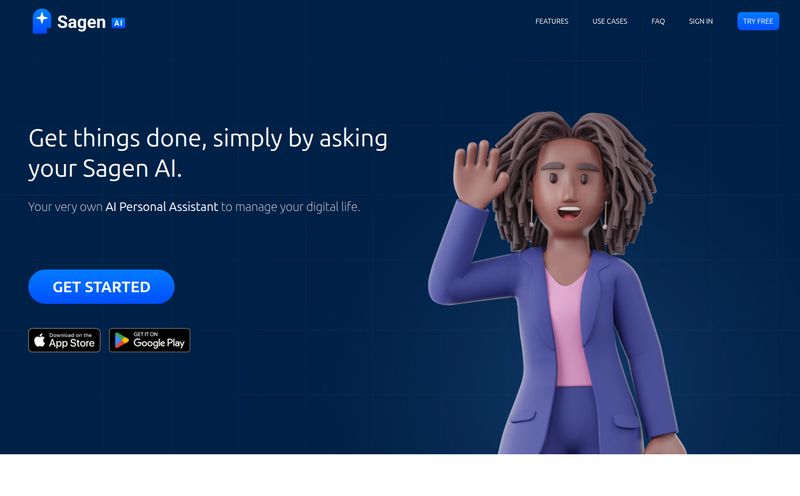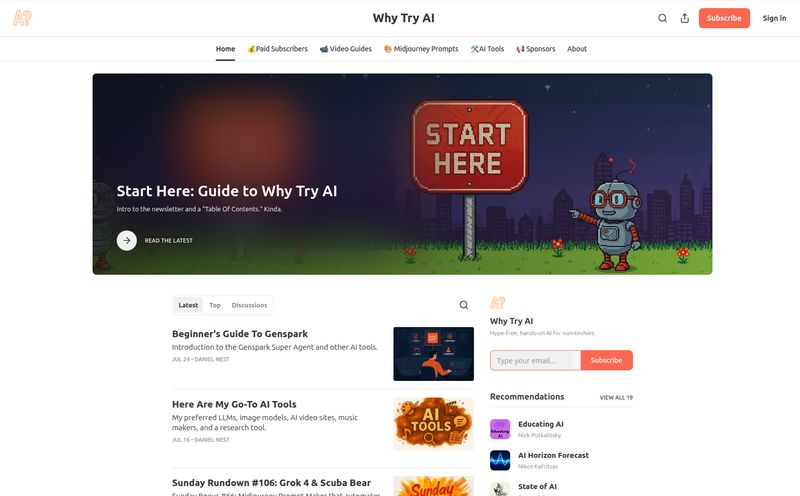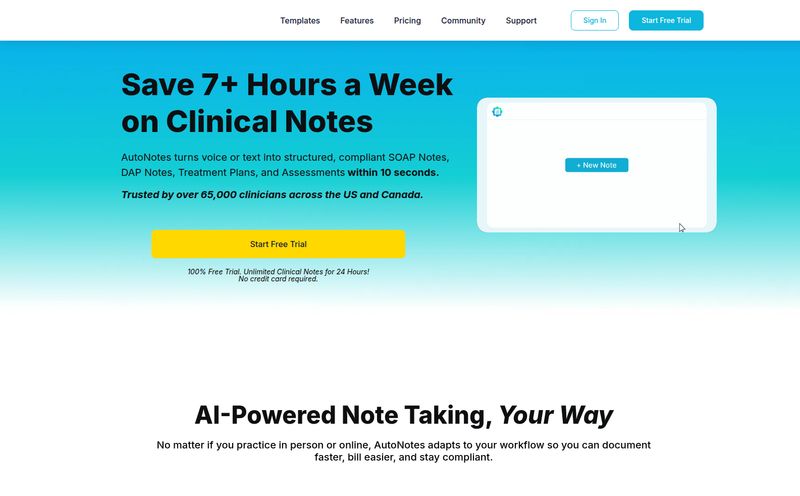Every so often, a new tool pops up on Product Hunt that makes you pause. Amid the sea of productivity hacks and AI-powered everything, something a little softer, a little more… human, catches your eye. That was my first impression of Bell, an AI that bills itself as a "trustworthy confidant."
We're all drowning in tech that promises to make us more efficient, more marketable, more something. But what about tech that just... listens? The idea is appealing, right? A space to unload your brain without worrying about judgment, unsolicited advice, or burdening a friend. It’s a growing niche in the AI world, and honestly, one I'm both fascinated and wary of. So, I decided to take a look.
What Exactly is This Bell AI Thing?
Let's get the basics out of the way. Bell isn’t a task manager or a content generator. It's designed to be a private, one-on-one conversational partner. Think of it less like a therapist and more like a digital diary that can actually talk back. The entire premise, from what I've seen, is to provide a judgement-free zone where you can air out your concerns—big or small—and maybe gain a bit of clarity in the process.
The landing page immediately sets a gentle tone. It's all soft colors and reassuring language. It doesn’t scream at you with flashy features; it whispers. And its core promise is simple: "ask me anything without any hesitation."
My First Impressions: A Soft-Spoken Digital Friend
When you land on their site, you're greeted by Bell itself. The introduction is disarmingly simple: "Hey there, I'm Bell, your trustworthy confidant..." It immediately tries to build a rapport.

Visit Bell
What really stood out to me were the prompt suggestions. They weren't generic things like "How can I be more productive?". They were vulnerable. Things like:
- "I constantly compare myself to others, to my detriment."
- "My finances are in disarray and causing stress."
- "There's been a noticeable change in my libido."
That takes guts. It signals that this space is intended for the messy, complicated thoughts we usually keep locked away. And right below the main prompt, a little pink banner seals the deal: "Don't worry, I won't disclose our conversations to anyone. It's our little secret ♥". It’s a smart touch, building trust from the very first second.
The Core Promise: A Judgement-Free Sanctuary
The biggest selling point here is confidentiality. In a world of data leaks and digital footprints, the idea of a truly private conversation is almost a luxury. We all self-censor. We curate our thoughts for our partners, our friends, even our journals. The fear of being misunderstood or judged is a powerful inhibitor.
Bell attempts to remove that barrier entirely. By talking to a non-sentient AI, the social pressure evaporates. There's no one to impress, no one to disappoint. Its a raw, unfiltered outlet. This is probably its most powerful feature. For people who have trouble opening up, or just need to say something out loud to make it real, this could be an incredible first step. It’s a training partner for your emotional muscles, letting you practice vulnerability in a zero-stakes environment.
Where Bell Shines (And Why That Matters)
I've been in the SEO and digital trends game for a long time, and I've seen the mental wellness app market explode. Most of them are focused on guided meditations or structured programs. Bell takes a different path.
The true advantage here is the lack of structure. It’s a blank canvas. Sometimes you don't need a ten-step plan to fix your anxiety; you just need to vent about your horrible boss for ten minutes without someone telling you to "look on the bright side."
This is where Bell could really find its audience. It provides a unique kind of support that’s hard to get elsewhere. It offers Immediate Availability, since your thoughts don't operate on a 9-to-5 schedule. An AI confidant is there at 3 AM when you're overthinking a conversation from yesterday. Then there's the Total Anonymity; the freedom to talk about taboo subjects—money, sex, jealousy, career failures—without attaching your name to them is incredibly liberating. And finally, it encourages Self-Reflection. Just the act of articulating a problem can often lead to the solution. Bell serves as a sounding board, forcing you to put nebulous feelings into concrete words, which is often the hardest part.
Holding Back a Little: The Necessary Caveats
Okay, let's get real. As intrigued as I am, my professional skepticism is kicking in. And there are some significant gray areas here.
First, who is Bell? The platform offers very little information about the expertise or psychological principles behind the AI's responses. Is it based on Cognitive Behavioral Therapy (CBT) principles? Is it just a large language model trained on the open internet? As we in the SEO world know, E-E-A-T (Experience, Expertise, Authoritativeness, and Trustworthiness) is everything, especially in the Your-Money-Your-Life (YMYL) category of health and wellness. Bell is currently a black box, and that's a concern.
Second, and this is a big one, Bell is not a replacement for professional help. The tool itself doesn't seem to make this claim, but it's a line that can get blurry for users. For day-to-day stress or mild anxieties, it could be a helpful tool. For serious mental health conditions like severe depression, trauma, or suicidal ideation, talking to an AI is not only insufficient, it could be dangerous. It's critical that users understand this distinction.
Finally, there's the tech itself. As I was poking around, I hit a "404 page not found" error trying to access a deeper page. It's a minor hiccup, sure, and could be temporary, but it reminds you that this is still just a piece of software. Its effectiveness is entirely dependent on its programming, and glitches can happen. What if it gives a nonsensical or even unhelpful response at a critical moment? The reliability is still an open question.
What About the Cost? The Bell AI Pricing Mystery
So, how much does this digital secret-keeper cost? Right now, it appears to be free. I couldn't find a pricing page, a subscription prompt, or any mention of a cost. The link on Product Hunt just leads to the main page.
This is common for new tools trying to build a user base. My guess? They're in a beta phase, gathering data and refining the product. It’s possible they'll introduce a freemium model down the line—maybe with a limited number of free conversations per month—or a premium subscription for advanced features. For now, though, the barrier to entry is zero, which is great for anyone who's just curious.
Who Is Bell AI Really For?
After spending some time with the concept, I have a pretty clear picture of the ideal Bell user.
This tool is perfect for the overthinker, the journaler who wishes their diary would talk back, or anyone who needs a quick, private space to process a thought or feeling. It’s for the person who feels like their problems are "not big enough" to bother a friend with but are still weighing on their mind. It’s a low-pressure starting point for self-exploration.
It is not for someone in a crisis. It is not a substitute for a licensed therapist or counselor. Please, if you are struggling with severe mental health issues, reach out to a human professional. There are resources like the 988 Suicide & Crisis Lifeline available for a reason.
Frequently Asked Questions about Bell AI
Here are some quick answers to questions I imagine are on your mind.
Is Bell AI a replacement for therapy?
Absolutely not. Think of Bell as a supplementary tool for self-reflection and venting, not as a clinical or therapeutic service. It's not equipped to handle severe mental health conditions.
Is my conversation with Bell truly private?
The platform promises confidentiality, stating "I won't disclose our conversations to anyone." However, as with any online service, it's wise to be mindful. I would read their privacy policy (if and when its available) carefully to understand how data is stored and used, even if it's anonymized.
What kind of topics can I discuss with Bell?
Based on the prompts, virtually anything is on the table. From work stress and financial worries to relationship issues and personal insecurities. The goal is to be a space for any and all concerns.
How does Bell AI work?
The site doesn't specify the underlying technology. It's likely a sophisticated Large Language Model (LLM) that has been fine-tuned to have supportive, empathetic, and non-judgmental conversations. Its responses are generated based on the patterns it learned from vast amounts of text data.
Is Bell AI free to use?
Currently, all signs point to yes. There is no visible pricing information or subscription wall, making it free to try. This could change in the future.
Who created Bell AI?
This is one of the biggest unknowns. The website and Product Hunt page provide little to no information about the developers or company behind Bell. This lack of transparency is a point of caution.
A Final Thought on Our Digital Confidants
So, what’s my final verdict on Bell? I’m cautiously optimistic. I love the concept. I love the focus on creating a gentle, safe space in a digital world that often feels harsh and demanding. It's a tool with a good heart.
But it's still just a tool. It's a mirror that reflects your own thoughts back at you in a new light. It can be incredibly useful for clarity and a quick emotional release. But it lacks the nuance, shared experience, and genuine empathy of a human connection. It's not a friend. It's not a therapist. It's a new, interesting, and potentially helpful thing in between. And for some people, on some days, that might be exactly what they need. Just use it wisely.
Reference and Sources
- Bell's listing on Product Hunt.
- For immediate mental health support, please contact the 988 Suicide & Crisis Lifeline.
- For further reading on AI in mental health, articles from sources like Psychology Today can offer deeper perspectives.



